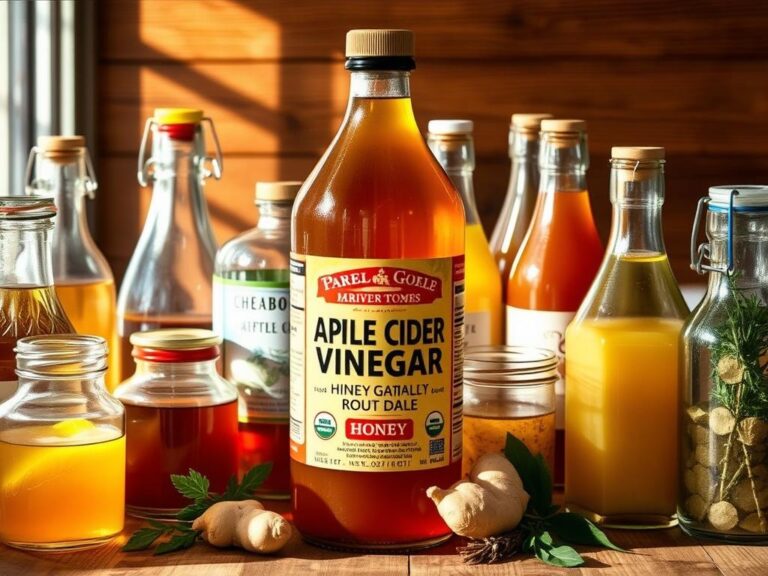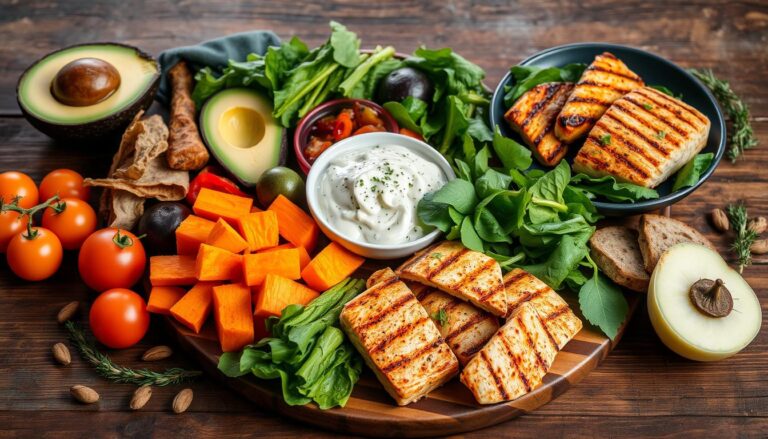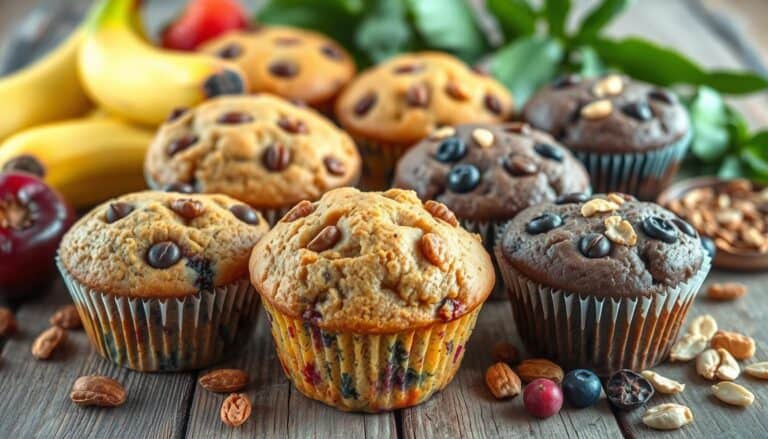The Rise of Natural Sweeteners in Healthy Baking
This post may contain affiliate links which means I may receive a commission for purchases made through links at no extra cost to you. I only recommend products I truly believe in. Thank you for your support!
As a passionate home baker, I’ve noticed a big change. More people want natural sweeteners in their baking. A survey showed 74% of people are cutting down on sugar. And 45% are looking for sugar substitutes.
This trend is big with millennials and Gen Z. They prefer natural ingredients. The baking world is changing fast to meet this demand.
The food industry is now offering many natural sweeteners. These include honey, maple syrup, agave nectar, and stevia. They taste great, feel right, and are good for us.
Key Takeaways:
- The baking industry is experiencing a shift towards natural sweeteners due to increased consumer demand for healthier options.
- 74% of consumers are actively reducing their sugar intake, and 45% are seeking out products with sugar substitutes.
- Millennials and Gen Z have a strong preference for ingredients derived from natural sources.
- The food industry is developing natural sugar alternatives that balance taste, texture, and functionality while maintaining cost-efficiency and clean-label credentials.
- Natural sweeteners like honey, maple syrup, and agave nectar are transforming the way we approach baking, allowing us to indulge in our favorite treats while prioritizing our overall wellness.
Understanding Natural Sweeteners and Their Appeal
As obesity rates climb and sugar worries grow, more people are looking for natural sweeteners. These are sweeteners from plants or natural sources with fewer calories than sugar.
Definition of Natural Sweeteners
Natural sweeteners include honey, maple syrup, and stevia. They are a natural way to satisfy sweet cravings. Unlike sugar, they don’t raise blood sugar as much.
Health Benefits for Consumers
More people know sugar is bad for them. 35% of Americans want less sugar in foods. The FDA’s new labeling rules will help natural sweeteners look even better.
Environmental Impact of Natural Sweeteners
Natural sweeteners are better for the planet than sugar. They come from sustainable crops and need less processing. This makes them a greener choice for cooking.
| Sweetener | Calorie Content (per tbsp) | Glycemic Index |
|---|---|---|
| Refined Sugar | 48 calories | 68 |
| Honey | 64 calories | 58 |
| Maple Syrup | 52 calories | 54 |
| Agave Nectar | 60 calories | 19 |
| Stevia | 0 calories | 0 |
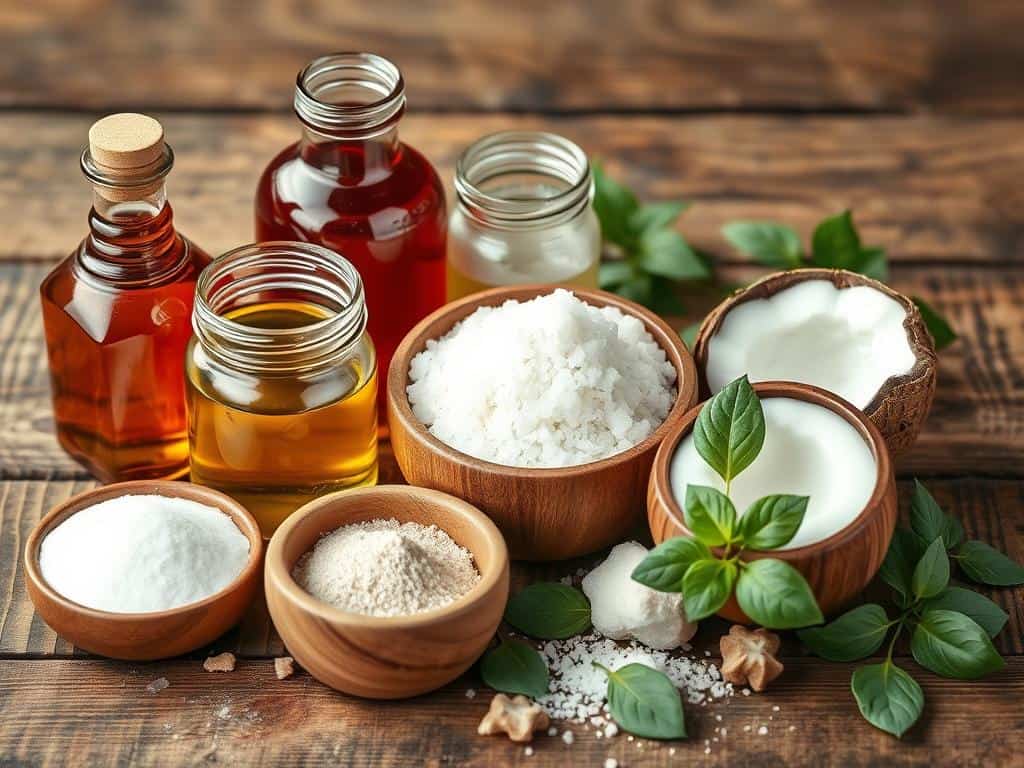
Natural sweeteners are becoming more popular for healthier eating. They offer a natural and sustainable choice. Knowing their benefits helps us make better choices for our health and the planet.
Popular Types of Natural Sweeteners
More and more people are looking for sugar alternatives. The market for natural sweeteners is growing fast. We’ll explore some top choices and what makes them special.
Honey: A Time-Honored Sweetener
Honey has been loved for thousands of years. It’s not just sweet; it’s full of nutrients and has antibacterial properties. It’s great in baked goods, adding moisture and a caramel flavor.
Maple Syrup: Nature’s Golden Syrup
Maple syrup is a favorite in North America. It’s made from maple tree sap and is full of antioxidants and minerals. It’s a healthier choice than regular sugar, adding a unique flavor to foods.
Agave Nectar: A Plant-Based Option
Agave nectar comes from the agave plant and is good for vegans. It has a low glycemic index, which is good for blood sugar. Its mild taste and thick texture make it useful in many recipes.
| Natural Sweetener | Unique Attributes | Potential Health Benefits |
|---|---|---|
| Stevia | Hundreds of times sweeter than sugar, zero calories | May help lower blood pressure, maintain healthy blood sugar levels |
| Monk Fruit | Zero-calorie sweetener, high in antioxidants | May reduce inflammation, assist in blood sugar management |
| Coconut Sugar | Lower sucrose content, rich in vitamins and minerals | May support gut health, lower glycemic impact |
Natural sweeteners add sweetness and improve the texture and shelf life of baked goods. As people focus more on health and sustainability, the demand for natural sweeteners keeps growing.

Substituting Sugar with Natural Sweeteners
More people are looking to cut down on sugar in their baking. This has led to a rise in using natural sweeteners. But, using these alternatives can be tricky and requires careful thought to get it right.
Key Considerations for Baking
Sugar is key for the texture, color, and moisture in baked goods. When switching to natural sweeteners, bakers need to think about their sweetness, volume, and how they work in recipes. Some, like stevia and monk fruit, don’t have the same volume as sugar. This means adding extra ingredients to keep the right texture.
Adjusting Recipes for Sweetness Levels
Natural sweeteners taste different from sugar. Bakers must find the right amount to get the sweetness just right. For example, honey is sweeter than sugar, while maple syrup and agave nectar are milder. It’s important to test and adjust to get the sweetness just right.
Texture and Baking Chemistry
Natural sweeteners can change how a recipe turns out. Some, like allulose, work well for browning and caramelizing. But, other sweeteners might need changes in baking time and temperature to get the best results.
| Natural Sweetener | Sweetness Level | Functional Properties | Recommended Substitution |
|---|---|---|---|
| Honey | 1.5 times sweeter than sugar | Provides moisture and softness | Replace 1 cup of sugar with 3/4 cup of honey |
| Maple Syrup | Slightly less sweet than sugar | Adds unique flavor and moisture | Replace 1 cup of sugar with 3/4 cup of maple syrup |
| Agave Nectar | 1.5 times sweeter than sugar | Provides a smooth, syrupy texture | Replace 1 cup of sugar with 2/3 cup of agave nectar |
Bakers need to be ready to try different things and make changes when using natural sweeteners. This is the only way to get the taste, texture, and success they want in their baking.
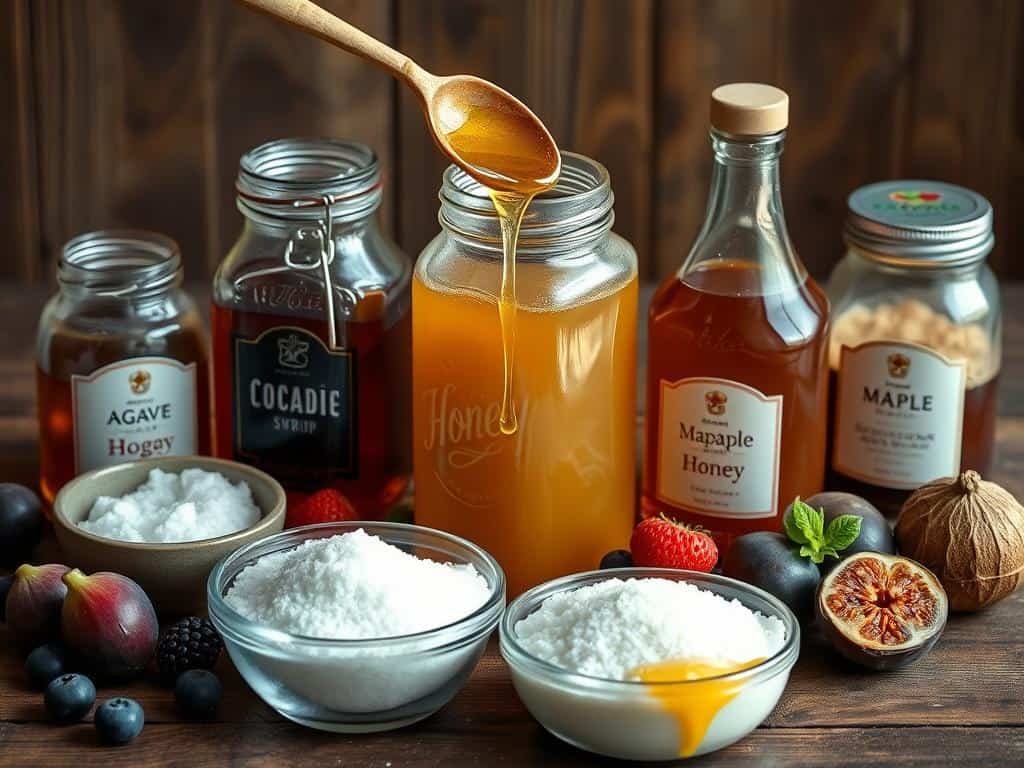
The Nutritional Profile of Natural Sweeteners
As more people look for healthier baking options, knowing about natural sweeteners is key. Unlike regular sugar, many natural sweeteners are not just sweet. They also have vitamins, minerals, and antioxidants that help with health.
Calories vs. Sugar: A Comparison
Natural sweeteners have fewer calories than regular sugar. Honey, maple syrup, and agave nectar are good choices for those watching their calories. Stevia and monk fruit sweetener are almost calorie-free, adding sweetness without sugar.
Vitamins and Minerals in Natural Sweeteners
Natural sweeteners also offer important vitamins and minerals. Honey, for example, has vitamins B6, C, and riboflavin, along with iron, calcium, and zinc. Maple syrup is rich in manganese and has antioxidants for extra health benefits.
Glycemic Index Explained
The glycemic index (GI) shows how fast a food raises blood sugar. Unlike regular sugar, many natural sweeteners have a low GI. This is good for people with diabetes or prediabetes.
“Natural sweeteners often have a lower glycemic index, meaning they don’t cause sharp spikes in blood sugar levels like traditional sugar.” – Registered Dietitian, Jane Doe
Knowing about natural sweeteners helps bakers make better choices. They can create tasty and beneficial baked goods that fit their health goals.
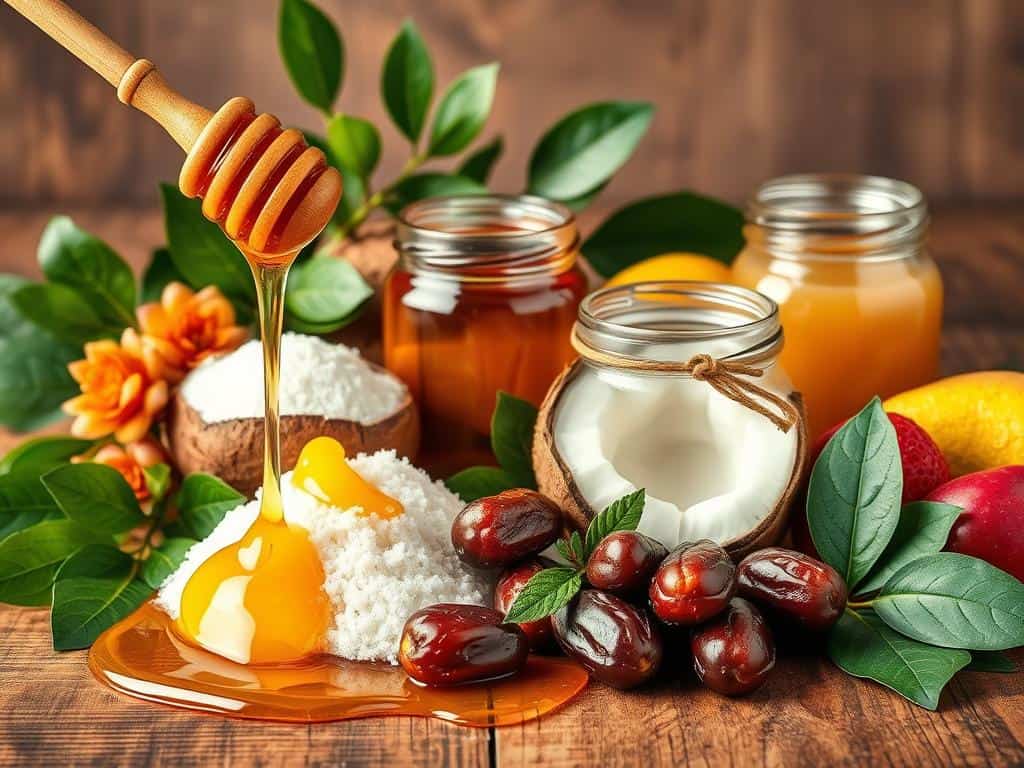
Natural Sweeteners and Dietary Preferences
Natural sweeteners have changed the game in healthy baking. They meet many dietary needs, like organic, vegan, and gluten-free. These sweeteners let you make tasty treats for everyone, without losing flavor or texture.
Organic and Non-GMO Options
Health-conscious people love organic and non-GMO sweeteners. Honey, maple syrup, and agave nectar are favorites. They’re made without harmful chemicals or genetic changes, offering a clean baking option.
Vegan-Friendly Sweeteners
More people are choosing plant-based diets. Luckily, sweeteners like agave nectar, maple syrup, and date syrup are vegan. They’re perfect for making tasty vegan desserts and baked goods.
Gluten-Free Baking with Natural Sweeteners
People with gluten issues can enjoy natural sweeteners. Honey, maple syrup, and coconut sugar are all gluten-free. This makes them key for gluten-free baking.
Natural sweeteners let bakers meet many dietary needs. Whether you’re looking for organic, vegan, or gluten-free options, there’s something for everyone. Natural sweeteners open up a world of possibilities for delicious, healthy baking.

Consumer Trends and Preferences
The baking world is changing fast. People want healthier options now. Studies show more folks are choosing natural sweeteners over sugar. About three-quarters of people think “natural” means “healthy.”
This change is because of worries about sugar’s health effects. It’s making natural sweeteners more popular.
Growing Demand for Healthy Alternatives
Sugar’s popularity has dropped from 52.5% in 2012 to 39.7% in 2020. More people see artificial sweeteners as unhealthy, at 69%. This shift has led to a big increase in natural sweetener sales.
Honey, stevia, and monk fruit are now top picks. Honey’s popularity has grown by 9 points since 2012.
Awareness and Education on Natural Sweeteners
More people want to learn about different sugars and sweeteners. Two-thirds of consumers want to know more. This desire for knowledge has sparked more educational content.
Influencers and brands are sharing the benefits of natural sweeteners. This helps people make informed choices.
Social Media Influences on Baking Choices
Social media has a big impact on baking choices. Food bloggers and influencers are key in promoting natural sweeteners. They inspire their followers to try healthier options.
This has led to more innovation in the baking industry. Now, there are more natural sweetener-based products available.
| Sweetener | Market Share Growth (2012-2020) |
|---|---|
| Honey | +9 points |
| Stevia | +32% |
| Erythritol | +175% |
| Monk Fruit | +48% |
| Allulose | +903% |
The baking industry is changing fast. People want healthier options. As they learn about natural sweeteners, the market grows.
This shift is making the industry innovate. Now, there are more natural sweetener-based products available. It’s all about meeting the needs of health-conscious bakers.
Innovative Recipes Featuring Natural Sweeteners
The world of healthy baking is changing fast, with natural sweeteners leading the way. Both home bakers and chefs are using these healthier options. They make delicious muffins, quick breads, and desserts that are good for you.
Healthy Muffins and Quick Breads
Muffins and quick breads with natural sweeteners are tasty and low in calories. They use nuts, seeds, and fruits for extra nutrition. For example, banana oatmeal cookies are made with just bananas, oats, and honey. They’re under 50 calories each.
Guilt-Free Desserts
People want desserts that are sugar-free, and bakers are answering with new recipes. Sweeteners like allulose and coconut sugar add sweetness without raising blood sugar. Try avocado chocolate mousse or chia seed pudding with berries for a sweet treat.
Breakfast Options: Pancakes, Waffles, and More
Starting your day with a sweetener-infused breakfast is popular. Pancakes and waffles can be made with honey, maple syrup, or bananas. This makes for a healthy and tasty morning.
These recipes show the exciting future of healthy baking. By choosing natural sweeteners, we can make our breakfasts and desserts better for us.
Overcoming Challenges in Healthy Baking
Using natural sweeteners in baking is a tasty and healthy path, but it comes with its own set of challenges. Finding the right balance between taste and health is key when switching from regular sugar to natural sweeteners. It takes practice to get the hang of healthy baking, including adjusting cooking methods and understanding each sweetener’s unique traits.
Taste vs. Health: Finding Balance
Finding the perfect mix of taste and health in baking is a big challenge. Sweeteners like stevia take longer to sweeten than sugar, which can be tricky to get right. Mixing stevia with other low-calorie sweeteners, like allulose or erythritol, can help balance out the sweetness.
Cooking Techniques and Baking Time Adjustments
Changing cooking methods and baking times is crucial when using natural sweeteners. These sweeteners have different properties than regular sugar, affecting how they cook and brown. Bakers need to be flexible and adjust their techniques, like oven temperatures and baking times, to get the right texture and taste.
Common Mistakes to Avoid
- Over-relying on a single natural sweetener: Diversifying your sweetener portfolio can help achieve more balanced flavors and textures.
- Neglecting the need for bulking agents: Natural sweeteners may lack the same volume-enhancing properties as sugar, requiring the addition of ingredients like nut flours or starches.
- Ignoring the impact on baking chemistry: Changes in sweetener type can affect factors like rise, browning, and moisture content, necessitating adjustments to the recipe.
Learning to use natural sweeteners in baking is a journey of trial and error. By understanding each sweetener’s unique qualities and adjusting your techniques, you can make delicious, healthy treats that please both your taste buds and your health goals.
The Future of Natural Sweeteners in Baking
The baking world is changing fast. People want healthier and greener options. This push is leading to new ideas and better natural sweeteners.
Industry Trends and Predictions
More people are cutting down on sugar. They prefer products with natural sweeteners instead. This change is making natural sweeteners more popular.
Research and Development in Natural Sweeteners
Companies are working hard to create new natural sweeteners. Stevia, for example, is a zero-calorie sweetener that tastes great. Monk fruit and allulose are also getting attention for their sweet taste and low calories.
The Role of Sustainability in Sweetener Choices
Sustainability matters a lot when choosing sweeteners. Brands like KOA are using dried cacao fruit for its sweetness and nutrients. South African raisins are also becoming a favorite for their natural sweetness and eco-friendliness.
With new tech, we’ll see even better natural sweeteners soon. They’ll be healthier and kinder to the planet, meeting our growing demand for green baking.
“The future of natural sweeteners in baking is poised for growth, driven by consumer preferences and the industry’s commitment to innovation and sustainability.”
Influencer and Brand Contributions
As more people want healthier baking options, brands and bakers are stepping up. Companies like Lindt, known for their high-quality chocolates, are using natural sweeteners like honey and maple syrup. This move is setting new trends and encouraging others to choose healthier options.
Baking influencers, with their big social media followings, are key in promoting natural sweeteners. They share recipes that use honey and maple syrup, like honey-sweetened muffins and maple syrup pancakes. This helps their followers try these alternatives in their own baking.
Brands, influencers, and health experts working together are also important. They team up to spread the word about natural sweeteners. This partnership helps people understand the benefits of natural sweeteners, from their health benefits to their positive impact on the environment.
Baking influencers and brands are changing the baking world by focusing on natural sweeteners. They’re helping people make better choices and showing them the possibilities of healthier baking.
Community and Accessibility of Natural Sweeteners
The demand for healthier baking options is rising. This has made natural sweeteners more accessible. Now, you can easily find and use these ingredients in your kitchen. Whether it’s local shops, online stores, or subscription boxes, finding quality natural sweeteners is simple.
Local Sources for Natural Sweeteners
Connecting with local producers is rewarding. You can find the best natural sweeteners at farmers’ markets, CSAs, and specialty stores. Options like honey, maple syrup, and South African raisins are available.
Online Shops and Subscription Boxes
Online shopping offers a wide range of natural sweeteners. E-commerce sites and subscription services make it easy to try new brands and flavors. You can have them delivered right to your door.
Workshops and Events for Baking Enthusiasts
Local bakeries and culinary schools host workshops on natural sweeteners. These hands-on sessions teach about their properties and uses. You can learn to make healthy baked goods and meet others who love baking.
By using these resources, bakers can easily make healthier treats. This supports a sustainable baking culture.
| Natural Sweetener | Glycemic Index | Nutritional Benefits |
|---|---|---|
| Honey | 55 | Rich in antioxidants, antimicrobial properties, and trace minerals |
| Maple Syrup | 54 | Contains antioxidants and compounds that may slow down blood sugar absorption |
| Stevia | 0 | Zero-calorie, hundreds of times sweeter than sugar, low glycemic index |
| Coconut Sugar | 54 | Lower sucrose content, good source of minerals, and lower glycemic index |
Conclusion: Embracing a Healthier Baking Future
Natural sweeteners are changing how we bake and what we eat. Health-conscious people want tasty, nutritious treats. Bakers are now using natural sweeteners that taste great and are good for us.
Summary of Key Takeaways
We’ve seen how natural sweeteners like honey and maple syrup can make baking healthier. They add flavor and health benefits to our treats. There’s also a big push for baked goods that are plant-based and safe for everyone.
Encouragement to Experiment with Natural Sweeteners
Exploring natural sweeteners is exciting. They can make your baked goods healthier and tastier. Try them in muffins, desserts, or breakfast items. It’s fun to find the right mix of taste and health for you.
Your Role in the Movement Towards Healthy Baking
Using natural sweeteners in your baking helps you and the baking world. Your choices can inspire others and lead to change. Together, we can make baked goods that are both delicious and healthy.

